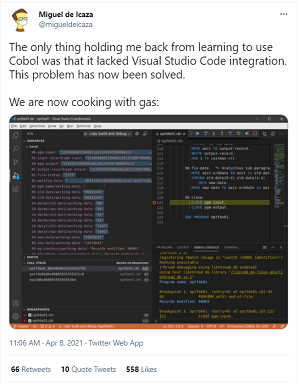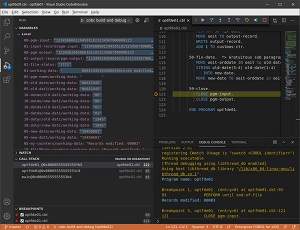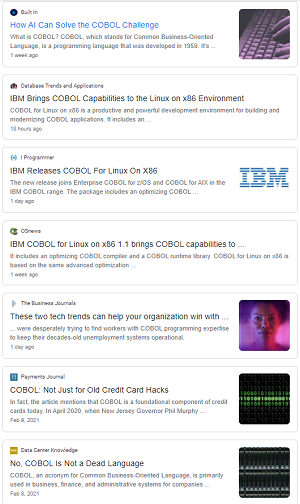News
Miguel de Icaza Stirs Up COBOL Talk with VS Code Tweet
One programming language you don't hear much about when covering the Microsoft-centric development beat is COBOL. That changed last week with a tweet from Miguel de Icaza, known for starting GNOME, Mono and Xamarin, among many others.
In other words, when the Microsoft Distinguished Engineer tweets, developers in the Microsoft dev ecosystem listen.
 [Click on image for larger view.] Cooking with Gas (source: Twitter).
[Click on image for larger view.] Cooking with Gas (source: Twitter).
His April 8 tweet read: "The only thing holding me back from learning to use Cobol was that it lacked Visual Studio Code integration. This problem has now been solved. We are now cooking with gas."
Here is the tweet's image of COBOL being used in VS Code:
 [Click on image for larger view.] COBOL in VS Code (source: Twitter).
[Click on image for larger view.] COBOL in VS Code (source: Twitter).
COBOL, standing for "COmmon Business Oriented Language," is a 62-year-old programming language hearkening back to days of coding on mainframes with punch cards (which undoubtedly provokes "huh, what's a punch card?" reactions from younger Visual Studio Magazine readers who never dropped a stack of ordered punch cards into an unordered mess in a high school programming class).
It was once thought to be long out of favor -- until banks and other organizations noticed all the COBOL cowboys were retiring, no longer available to fix their systems, update or migrate code and so on. Suddenly graybeard programmers were back in style. More recently, government organizations were looking for COBOL help to maintain and upgrade jobless benefits systems during the COVID-19 pandemic.
Now, surprisingly, COBOL is all the rage:
 [Click on image for larger view.] COBOL Isn't Dead! (source: Google News).
[Click on image for larger view.] COBOL Isn't Dead! (source: Google News).
My colleague John K. Waters at sister site ADTmag summed up the situation last year in a post titled "Looking for a Few Good (or Bad, or Ugly) COBOL Programmers."
Nevertheless, this reporter didn't think COBOL carried much weight in the Microsoft dev space, but it turns out he was wrong. There are many COBOL tools for Visual Studio and VS Code. For just one example, COBOL specialist Micro Focus offers "Visual COBOL 5.0 for Visual Studio 2019."
Several more for-pay offerings appear in the Visual Studio Marketplace, along with dozens of free ones in the VS Code Marketplace.
Returning to de Icaza's tweet, when asked by a follower what plugin was being used, he said: "That's a screenshot from gun/cobol, I don't know what they are using."
This reporter couldn't find anything about "gun/cobol," but it may have been a typo-inflicted reference to GnuCOBOL in the VS Code Marketplace.
Either way, the tweet stirred up both serious and humorous discussion, along with 66 retweets, 10 quote tweets and 558 likes.
When one reader said "I'm waiting for cobol#," de Icaza replied "Wait no more" and pointed to NetCOBOL for .NET from GTSoftware.
Here are some other comments:
- "That's random. I too was just wondering about learning COBOL, to implement a fictional CP/M based spaceship computer's applications, because 8080 asm is just a slog. Moral: don't eat cheese before bedtime."
- "COBOL is, no joke, a respectable language. Early and rough but with ideas worth considering. It demands a program structure for example. Which would take a while to catch on as frameworks. It is very linear and in that respect has something akin to parallel programs. Fascinating."
- "Highest paying programming skill"
- "Preach. I'd learn COBOL just to make that sweet $$$ fixing stupid bugs in banking systems"
- "The only thing holding me back from learning to use Cobol is the language"
- "I'm still waiting for ${insert_your_obscure_text_editor} to have official support."
- "I'm speechless. The language of punch cards, in an IDE. What's old is new again."
- "Nooooooooooooo"
Despite that last comment, the COBOL resurgence seems to be going strong. For example, just this week IBM announced IBM COBOL for Linux on x86.
Long live COBOL!
About the Author
David Ramel is an editor and writer at Converge 360.